Borealis, R&D Startup Collaborate on Low-Cost, High-Performance, Sustainable Single-Use Polyolefin Foam Packaging
Bocatech’s EcoCore molding technology combined with two key Borealis PP grades produces eco-friendly molded products that require less material.
It is always exciting to report on new technology, particularly when it both offers high performance and also is “kind” to the environment. Naturally, single-use food and beverage packaging advances are at the top of the heap of interest as so much of it is consumed on a daily basis and then wasted, and market demand for reusable and more easily recyclable replacement solutions is rising.
Among an increasing number of resin companies that are taking a lead in this sustainability direction, often through partnerships with new technology startups, is Austria’s Borealis (U.S. office in Port Murray, N.J.), recognized as a leader of innovative solutions in the fields of polyolefins, base chemicals and fertilizers. The company recently announced a new strategic alliance with Bockatech, a UK early stage Greentech R&D firm and provider of its patented EcoCore technology—a new plastic molding technology for sustainable packaging.
This new material and technology partnership are expected to advance the circular economy by developing low-cost, high-performance, reusable, and recyclable foam injection molded packaging. This open-innovation agreement is also expected to accelerate the development of Bockatech’s technology, broadening the platform so that it can be licensed to more manufacturing partners in a variety of markets for multiple applications.
According to the partners, the EcoCore technology in combination with two key Borealis PP grades is an eco-friendly way to produce high-performance packaging that is reusable and recyclable. The two grades are:
● Borealis grade BH381MO is a heterophasic copolymer, which is characterized by an optimum combination of very high stiffness and high-impact strength. This grade uses Borealis Nucleation Technology (BNT) to increase productivity by cycle time reduction. BNT, in combination with excellent stiffness and good flow properties is said to create high potential for wall-thickness reduction. Products originating from this grade boast very good demolding properties, well-balanced mechanical properties, excellent dimensional consistency with respect to different colors and good organoleptic properties.
● Daploy WB140HMS (high-melt strength), meanwhile, is touted as a PP with an LDPE-like processability. This new product family for packaging applications is said to make possible the production of extruded PP foams with a wide density range and a broad property profile. WB140HMS is a long chain-branched PP developed for the foam extrusion process. Unlike conventional PP, it has HMS plus greatly increased extensibility in the melt phase. This is also the case when the grade and its blends are combined with other PP materials. Based on the unique rheological behavior of WB140HMS, cell growth and foam structure can be stabilized much better than when using conventional PP. Collapse and coalescence of cells is reportedly prevented or significantly reduced, enabling the manufacture of closed-cell, low-density foams. Significant weight reduction is claimed with up to 30-fold volume expansion on production lines said to be achievable.
Foamed molded products made with EcoCore require less material and have faster cycle times to reduce material costs, energy use and environmental impact. Investment costs for new equipment are also minimal, say the partners. Reusable and recyclable end products made using EcoCore feature high strength and a smooth surface finish ready for printing. The foam core also offers excellent insulation and is ultra-lightweight. Their high strength also makes them ideal for deposit return schemes that have been proven to deliver material recovery rates of up to 94% and reduce the likelihood of plastics entering the marine environment. As mono-material packaging, EcoCore solutions are 100% recyclable. Applications can include:
● Cups—ranging from insulated to-go hot coffee cups for quick-service restaurants (QSRs) to beer and soft-drink containers for sports events and festivals.
● Pots—insulated pots for instant noodles and bowls, as well as other containers for soups and stews from QSRs.
● Tubs—for foods in the frozen and cold cabinets at both supermarkets and QSRs—from ice cream to yogurt and butter.
● Trays—insulated trays for microwaveable ready meals, as well as packaging for meats and delicate fruits.
Said Andreas Leitner, head of new business development at Borealis, “As strong advocates for the circular economy within our industry, we at Borealis are eager to partner with pioneering firms like Bockatech to develop polyolefins-based solutions that are reusable and recyclable. Combining our foam products with EcoCore technology to produce innovative, lightweight solutions is more than an exciting business opportunity: it’s a real step forward for more circularity in packaging.”
Added Chris Bocking, CEO and founder of Bockatech,“We’re delighted to have found in Borealis a partner who shares our commitment to developing new solutions for innovative packaging with reduced environmental impact. Combining our EcoCore technology with Borealis materials and expertise in foam will produce viable new applications, which offer significant benefits for businesses, consumers and the environment.”
Related Content
In Sustainable Packaging, the Word is ‘Monomaterial’
In both flexible and rigid packaging, the trend is to replace multimaterial laminates, coextrusions and “composites” with single-material structures, usually based on PE or PP. Nonpackaging applications are following suit.
Read MoreFundamentals of Polyethylene – Part 6: PE Performance
Don’t assume you know everything there is to know about PE because it’s been around so long. Here is yet another example of how the performance of PE is influenced by molecular weight and density.
Read MoreThe Fundamentals of Polyethylene – Part 2: Density and Molecular Weight
PE properties can be adjusted either by changing the molecular weight or by altering the density. While this increases the possible combinations of properties, it also requires that the specification for the material be precise.
Read MorePolyethylene Fundamentals – Part 4: Failed HDPE Case Study
Injection molders of small fuel tanks learned the hard way that a very small difference in density — 0.6% — could make a large difference in PE stress-crack resistance.
Read MoreRead Next
Understanding Melting in Single-Screw Extruders
You can better visualize the melting process by “flipping” the observation point so that the barrel appears to be turning clockwise around a stationary screw.
Read MoreProcessor Turns to AI to Help Keep Machines Humming
At captive processor McConkey, a new generation of artificial intelligence models, highlighted by ChatGPT, is helping it wade through the shortage of skilled labor and keep its production lines churning out good parts.
Read More


















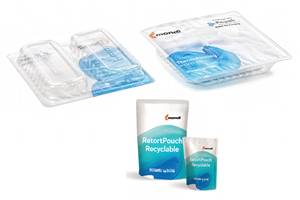
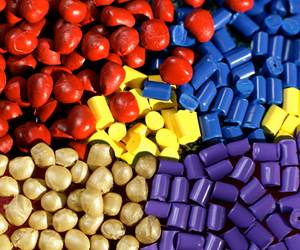
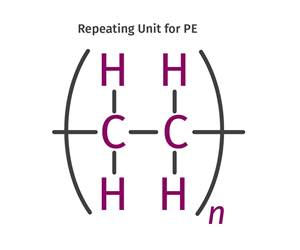
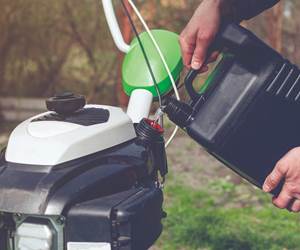
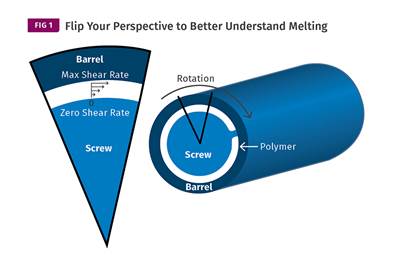
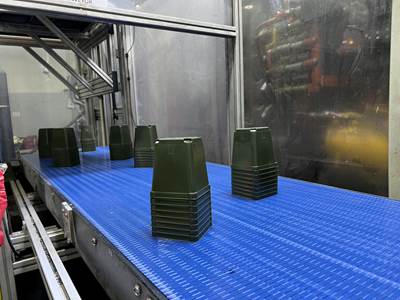
.png;maxWidth=970;quality=90)